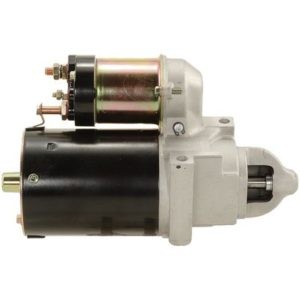Replacing a faulty starter motor is a common car repair. Understanding the Starter Motor Replacement Cost and the factors influencing it can help you budget effectively. This guide provides a detailed breakdown of expenses, common symptoms of a bad starter, and troubleshooting tips.
 alt
alt
Factors Affecting Starter Motor Replacement Cost
Several factors contribute to the overall cost of replacing a starter motor:
- Part Cost: A rebuilt starter can cost between $50 and $350, while a new one ranges from $80 to over $350. Prices vary based on brand, quality, and vehicle compatibility.
- Labor Cost: Labor charges for starter replacement typically range from $150 to over $1,100. This depends on the mechanic’s hourly rate, the complexity of the job (starter accessibility), and the vehicle’s make and model. Some vehicles have easily accessible starters, replaceable in under an hour. Others, located beneath the intake manifold, require more labor.
- Vehicle Type: The make, model, and year of your vehicle significantly impact the cost. Replacing a starter on a common sedan like a Toyota Camry might be less expensive than on a large truck like a Ford F-150 due to part availability and labor time. Luxury vehicles often require specialized parts and more intricate labor, increasing the cost. For example, luxury cars like a BMW or Audi often have starters positioned in more challenging locations within the engine bay, demanding greater disassembly efforts.
Signs of a Bad Starter Motor
A failing starter motor exhibits several symptoms:
- Erratic Cranking: The engine cranks slowly or inconsistently.
- No Response When Turning the Key: The engine doesn’t crank at all when you turn the ignition key.
- Unusual Noises: Grinding or clicking sounds when starting the vehicle often indicate a problem with the starter’s gear or flywheel. A slow cranking speed might also suggest a failing starter struggling to turn the engine. These sounds can also indicate issues with the flywheel ring gear or the starter drive gear.
Other potential issues mimicking a bad starter include a dead battery, a faulty starter relay or fuse, or problems with the ignition system. It’s crucial to diagnose the problem accurately before replacing the starter.
Troubleshooting Starter Motor Problems
Before concluding that your starter needs replacement, perform these checks:
- Battery Test: Verify the battery voltage with a multimeter. A reading below 12.4 volts indicates a weak or dead battery. Ensure headlights and other electrical components function correctly.
- Battery Connections: Inspect battery terminals for corrosion and ensure they are tightly connected.
- Fuse Check: Examine the fuse box for any blown fuses related to the starter or ignition system.
- Noise Diagnosis: Listen for clicking sounds (indicating a faulty starter) or silence (suggesting ignition switch or wiring problems) when turning the key.
- Starter Relay Test: Check the starter relay functionality when turning the ignition key.
- Wiring Inspection: Examine wires connecting the starter and battery for damage or looseness.
- Jump-Starting: Attempt to jump-start the vehicle. Success suggests a battery or alternator issue, not necessarily a starter problem.
Starter Motor Replacement: DIY or Professional?
Replacing a starter can be a DIY project for those with mechanical experience and the right tools (socket set, wrenches, jack stands, etc.). However, due to the starter’s location and the potential complexity of the job, professional replacement is often recommended.
Repair vs. Replace: Starter Motor
Determining whether to repair or replace the starter depends on the specific issue. Simple component failures might be repairable with a rebuild kit. However, significant damage often warrants a complete replacement, as it’s more cost-effective and reliable in the long run.
Conclusion
Starter motor replacement cost varies based on several factors. Understanding these factors, recognizing the signs of a failing starter, and troubleshooting potential issues can help you make informed decisions and budget accordingly. While a DIY replacement is possible, professional service ensures a correct and safe repair.
FAQs
1. What are common bad starter symptoms?
Clicking sounds, slow cranking, no engine cranking, and intermittent starting problems.
2. How long does starter replacement take?
Typically 1-2 hours, but can vary significantly depending on the vehicle.
3. Can I drive with a bad starter?
No, a functioning starter is essential for starting the engine.
4. Is rebuilding or replacing a starter cheaper?
Rebuilding is generally cheaper, but replacing is more reliable long-term.
5. How often should a starter be replaced?
Starters typically last 100,000-150,000 miles, but there’s no set replacement interval.
